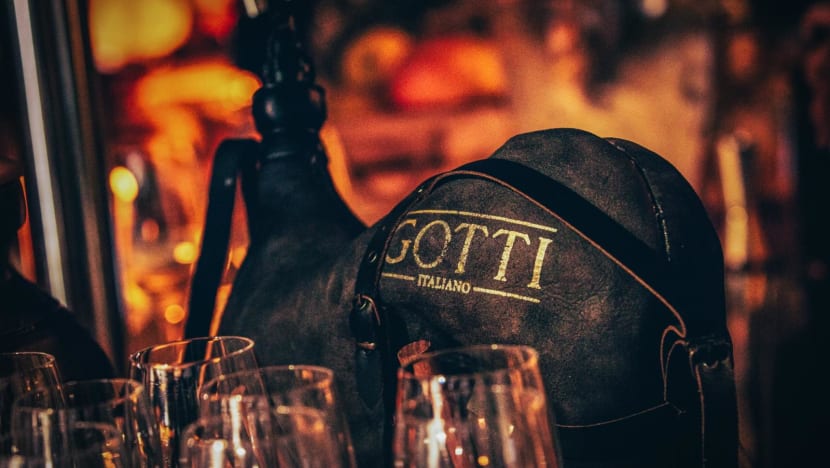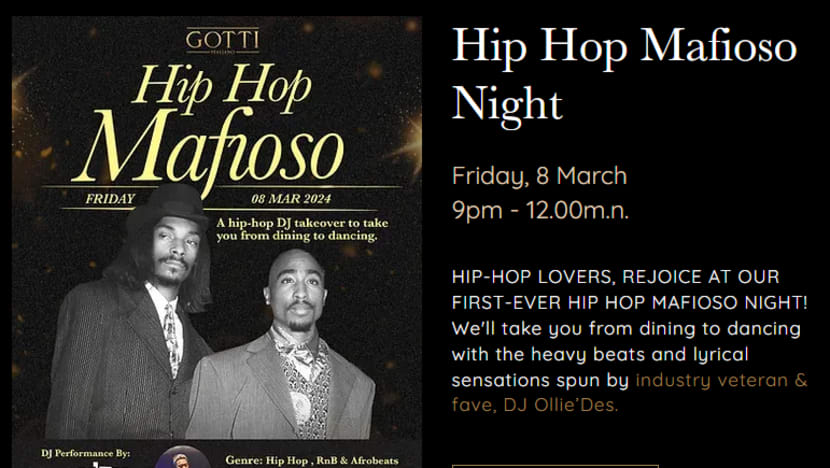'Glamorising' crime to create buzz for business shows lack of awareness about history, experts say
The Gotti Italiano restaurant and its Hip Hop Mafioso event were called out by Italy's ambassador to Singapore Dante Brandi.

Gotti Italiano has apologised for any offence caused by references to the mafia. (Photo: Facebook/Gotti SG)

This audio is generated by an AI tool.
SINGAPORE: By attempting to "glamorise" crime as a marketing tactic, businesses are displaying a lack of awareness about the dark historical context involved, branding experts said.
They were speaking to CNA after Italy's Ambassador to Singapore Dante Brandi criticised the Gotti Italiano restaurant for naming itself after an infamous criminal. He also took issue with the eatery organising an event titled Hip Hop Mafioso, saying: “Mafia is not what my country is proud of.”
The Amoy Street restaurant has apologised for any offence and said it will consider "all options moving forward” in naming itself.
John Gotti was a mob boss of Italian descent who led New York City's Gambino family, once described as America’s most powerful crime syndicate. He was convicted of five murders in 1992.

Gotti Italiano is not the first local food and beverage (F&B) establishment to be called out for associating its brand with crime or vice.
In 2018, the Embassy of Colombia in Singapore and the Central Narcotics Bureau (CNB) took issue with a bar called Escobar, named after the late Colombian drug lord Pablo Escobar.
It led to the embassy sending an official note to Singapore’s Ministry of Foreign Affairs. CNB also denounced the "highly objectionable" manner in which Pablo Escobar’s name and image were being used to promote the bar, and said it ran counter to Singapore’s zero-tolerance approach towards drugs.
Businesses might glamorise criminals or their vices because their clientele might be attracted to the "novelty", said Associate Professor Ang Swee Hoon from the National University of Singapore (NUS).
Infamous figures or events can capture public attention, and in a competitive market, a controversial name can set a business apart, drawing curiosity and foot traffic, said Mr Lee Haoming, chief executive officer of Louken Group, which helps companies with branding and marketing strategies.
But Associate Professor Lau Kong Cheen, who heads the marketing programme at the Singapore University of Social Sciences (SUSS) argued against capturing attention through controversial means.
“Getting attention is important in marketing, but not for the wrong reasons,” he said.
Professor Sharon Ng, deputy dean for Nanyang Business School’s marketing division at the Nanyang Technological University (NTU), pointed out that brands who use “inappropriate” names may not be fully aware of the crimes caused by such individuals.
“They are focusing (instead) on how using the names may make the brand look exciting,” she added.
POPULARISED BY ENTERTAINMENT
The experts CNA spoke to said such a lack of awareness could not be solely attributed to a generational disconnect.
"Young marketing teams may not fully grasp the historical context or the depth of the atrocities associated with these figures. This ... can lead to missteps in branding that offend or alienate,” said Louken Group’s Mr Lee said.
But this applies to everyone in general, he added.
SUSS’ Dr Lau pointed out that content related to violence, drug consumption, crime and gangsterism is easily available on various streaming platforms.
“Censorship of unacceptable behaviours and values are harder to administer – particularly to the young teens who can easily subscribe to Netflix, Viu and many other streaming services,” he said.
“Given this, all socially unacceptable values begin to be diluted and slowly become acceptable norms under the guise of entertainment. This is where criminals and infamous people are seen being glorified.”
Dr Lau cited hit Korean TV series Squid Game, which he said made “certain human values questionable”, and American movie Wall Street which popularised the “greed is good” line.
“If these movies are allowed to be screened, one may question the rationale why entertainment related businesses such as bars cannot follow the same controversial route?”
Additionally, in Singapore, drugs are “not as prevalent” as in other countries, and neither is there a mafia, noted NUS’ Assoc Prof Ang.
“Having the Gotti name or having an event with the word ‘mafia’ in it, for us would not mean that there’s going to be danger.
“We see it more as fun and (there’s) a bit of an edginess to it but we know there’s no real harm in terms of drugs being used or money laundering … It’s not real life to us here,” she said.
HOW TO TREAD SENSITIVITIES
To not end up in Gotti Italiano’s situation, it's as simple as brands doing due diligence and researching the historical and cultural context of names and themes, the marketing experts noted.
Even if a business' target audience does not react negatively to a name, it's important to remember that the brand also resides within broader society and backlash can come from other people who may take offence, said NTU’s Prof Ng.
Louken Group’s Mr Lee said companies can also involve in decision-making processes a diverse group of people from different cultural, historical and age backgrounds, to gain a variety of perspectives.
He added that businesses should always approach branding with “respect and empathy for all communities and individuals”, and avoid trivialising serious historical events or figures.
SUSS’ Dr Lau also pointed out the most important thing in brand building is to "define the identity of the brand that reflects its personality and positioning that will connect with the target audience”.
That should go into considerations for a name or title, he said, adding many don't take this seriously enough.
“Many treat brand names for just one purpose – to create attention – or (it's) name that the brand owner fancies."















